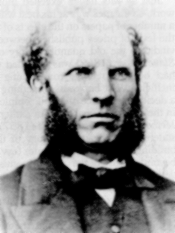| Profile | Major Works | Resources |
John Elliot Cairnes, 1823-1875

Born in County Louth, Ireland, the son of a brewer, John Elliot Cairnes was educated at Trinity College Dublin. He acquired his B.A. in 1848 and his M.A. in 1848. In 1856, Cairnes won an appointment to the the Whately Chair in Political Economy at Trinity College, Dublin, which he would hold until 1861. In 1859, Cairnes received a joint appointment as professor of jurisprudence at Queen's College Galway, which he would hold until 1870. From 1866 to 1870, Cairnes was a professor of political economy University College London. He retired in 1872, due to ill-health.
An ardent disciple and friend of John Stuart Mill, Cairnes is often regarded as "the last of the Classical economists". It was upon his shoulders that fell the responsibility of defending the Classical Ricardian doctrine in its waning years of 1869-75 -- against Thornton, against Ruskin, against his own disciple Cliffe-Leslie and, finally, against Jevons and the Marginalist Revolution.
Cairnes's most famous book -- the Whately lectures of 1857 -- was an attempt to outline the future research program for Classical economics. Decades later, in 1874, Cairnes offered the feeble, last gasp of Classical doctrine, with the wages fund doctrine embarrassingly defended and Jevons's new theory reluctantly reviewed.
Cairnes's shining hour was his widely-discussed 1862 treatise Slave Power. Cairnes analyzed the consequences of slavery for economic development, in particular how it speeded up soil erosion, discouraged the introduction of technical innovations and stifled commerce and enterprise more generally. Written during the American Civil War, Cairnes warned British policymakers to think twice about backing the economically-unviable Confederacy. Cairnes book was instrumental in turning the tide of popular English opinion against the rebels.
Cairnes's 1865 articles on the Irish land question were even more radical. Arguing that labor was the basis of property in land, Cairnes denounced the attempt to introduce an English-style free market for land in Ireland and to instead encourage peasant-proprietorship via State-controlled land rents. This radical proposal was taken up by John Stuart Mill in his own book on the Irish question -- and both Cairnes and Mill were met by howls of disapproval by classical liberals in England, who denounced the violation of the "sanctity of free contract".
Cairnes struck back in a series of 1870 articles in a full-frontal assault on laissez-faire dogmatism, arguing that while it was a "good rule of thumb", but had no "scientific basis" and certainly should not be applied indiscriminately as if it were a religion. Cairnes took aim particularly at the liberal heroes, Frederic Bastiat and Hebert Spencer, taking them to task for having transformed political economy into a muddled apologist theology.
|
Major Works of John E. Cairnes
|
|
HET
|
|
Resources on John Elliot Cairnes
|
All rights reserved, Gonšalo L. Fonseca
